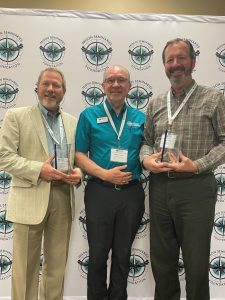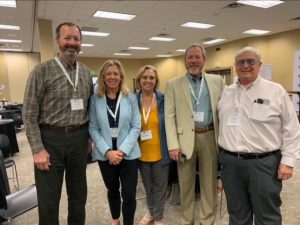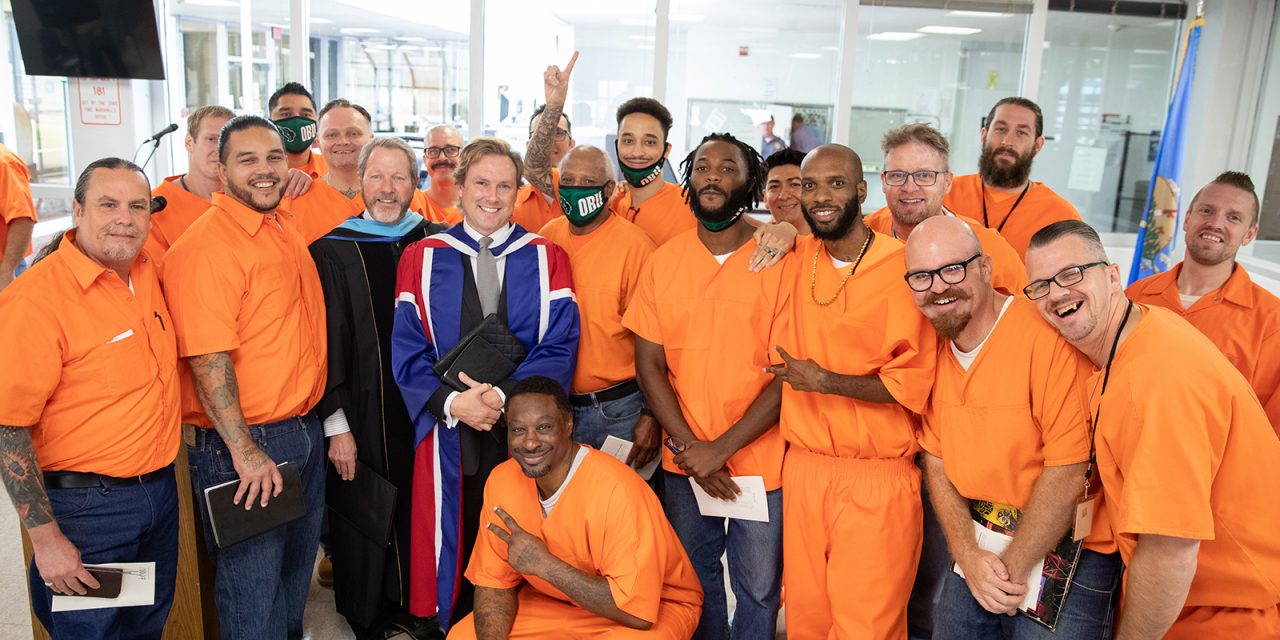SHAWNEE—Oklahoma Baptist University’s (OBU) Prison Divinity Program was recognized as the top academic institution of the year at the Fourth Annual National Moral Rehabilitation Conference in Memphis, Tenn. Lexington Assessment and Reception Center Chaplain Ron Lindsey also received the chaplain of the year award during the event. The conference is sponsored by the Prison Seminaries Foundation (PSF).

Oklahoma Baptist University’s Prison Divinity Program was recognized as the top academic institution of the year at the Fourth Annual National Moral Rehabilitation Conference in Memphis, Tenn. Lexington Assessment and Reception Center Chaplain Ron Lindsey also received the chaplain of the year award during the event. Shown are Bruce A. Perkins, OBU Director of the Prison Divinity Program in the Hobbs School of Theology and Ministry, Denny Autrey, Director of Operations for PSF and Chaplain Lindsey.
OBU, Oklahoma Baptists and the Oklahoma Department of Corrections are partners in this historic endeavor in Oklahoma. OBU offers a Bachelor of Arts degree in Christian Studies to inmates in an Oklahoma prison. Upon completion of their degrees, these men will be eligible to be commissioned as field ministers and deployed to other prisons across the state.
Oklahoma has one of the highest incarceration rates in the nation. This program equips inmates to minister to fellow inmates, providing an avenue for moral rehabilitation and reform throughout the prison system.
The degree is a fully accredited, four-year Christian liberal arts degree, which includes an internship with the prison chaplain. All courses are taught face-to-face at the Lexington Assessment and Reception Center. Students are carefully selected based upon their application materials and interviews and progress through the degree program together.
The program’s objectives are to facilitate change in the culture of the prison system with greater respect for authority as well as their fellow man, facilitate greater safety within each unit where field ministers are deployed and allowed to serve and to provide a pathway to reduced recidivism of those who have been impacted by the service of the graduates.
There are 67 students currently enrolled in the program. The first cohort of students begins their junior year this fall. The second cohort has completed the orientation term and begins courses for credit this fall.

Chaplain Lindsey is joined by Tricia Everest, Oklahoma Cabinet Secretary for Public Safety; Linda Perkins; Bruce A. Perkins, OBU Director of the Prison Divinity Program in the Hobbs School of Theology and Ministry and Burl Cain, Commissioner for the Mississippi Department of Corrections and CEO and Founder of PSF.
“God is doing a mighty work in the prisons across our nation,” said Bruce A. Perkins, director of the OBU Prison Divinity Program in the OBU Hobbs School of Theology and Ministry. “This recognition affirms the diligence of our students to their studies and their commitment to the objective of transforming prison culture. They are men dedicated to Christ and stewarding well the abilities and opportunities He has provided them. I am very proud of them and honored to accompany them on their journey.
“I am equally blessed to work alongside Chaplain Lindsey,” Perkins continued. “His eagerness to engage this program and seek its success has been invaluable. We could not do what we do without his support and involvement. He is a worthy recipient of the honor he received.”
According to PSF, the greatest asset in any department of corrections system is the morally rehabilitated inmate and as inmates become students, who become peer ministers, the effects of moral rehabilitation spreads throughout the population.
PSF’s website states, “We see a world where individuals in prison can regain their dignity and self-worth to become powerful agents of change for good, transforming their lives and the lives of those around them.”
Contact Perkins, bruce.perkins@okbu.edu, or visit okbu.edu/pdp for more information about the Prison Divinity Program. The program is funded through private donations, and no money is required of the Department of Corrections or the students. Oklahoma Baptists are lead donors of the program.





